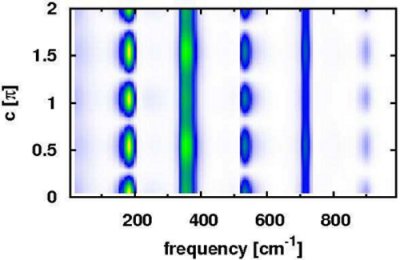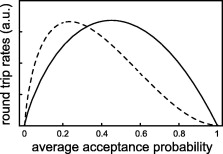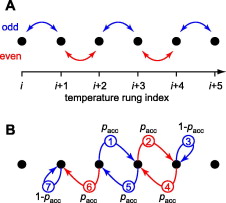Research Area C
Publications 2009
18-Feb-2011

Pulse trains (PTs) generated by sinusoidal phase masks emerged as a popular tool in the field of coherent control and have been applied successfully in many experiments. Although many attempts were made to throw light on the mechanism of the induced processes, it is not yet fully understood. Based on nonperturbative quantum dynamical calculations in the grid ... READ MORE
21-Sep-2009

A comprehensive investigation of selected excited states of xanthine has been performed with the CASSCF, CASPT2, CC2 and ADC(2) methods. The 7H-diketo and 9H-diketo tautomers of xanthine, which are the lowest-energy tautomers in the ground state, have been studied. A comprehensive investigation of the 1ππ*, 1nπ* and 1πσ* excited states of xanthine has been ... READ MORE

In replica exchange simulations, a temperature ladder with N rungs spans a given temperature interval. Considering systems with heat capacities independent of the temperature, here we address the question of how large N should be chosen for an optimally fast diffusion of the replicas through the temperature space. Using a simple example we show that choosing ... READ MORE
Hybrid methods, which combine a quantum mechanical description of a chromophore by density functional theory (DFT) with a molecular mechanics (MM) model of the surrounding protein binding pocket, can enable highly accurate computations of the chromophore’s in situ vibrational spectra. As a prerequisite, one needs a MM model of the chromophore−protein complex, ... READ MORE

In replica exchange simulations a fast diffusion of the replicas through the temperature space maximizes the efficiency of the statistical sampling. Here, we compare the diffusion speed as measured by the round trip rates for four exchange algorithms. We find different efficiency profiles with optimal average acceptance probabilities ranging from 8% to 41%. The ... READ MORE
For the enhanced conformational sampling in molecular dynamics (MD) simulations, we present “simulated solute tempering” (SST) which is an easy to implement variant of simulated tempering. SST extends conventional simulated tempering (CST) by key concepts of “replica exchange with solute tempering” (REST, Liu et al. Proc. Natl. Acad. Sci. U.S.A. 2005, 102, ... READ MORE


